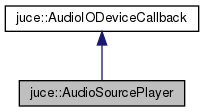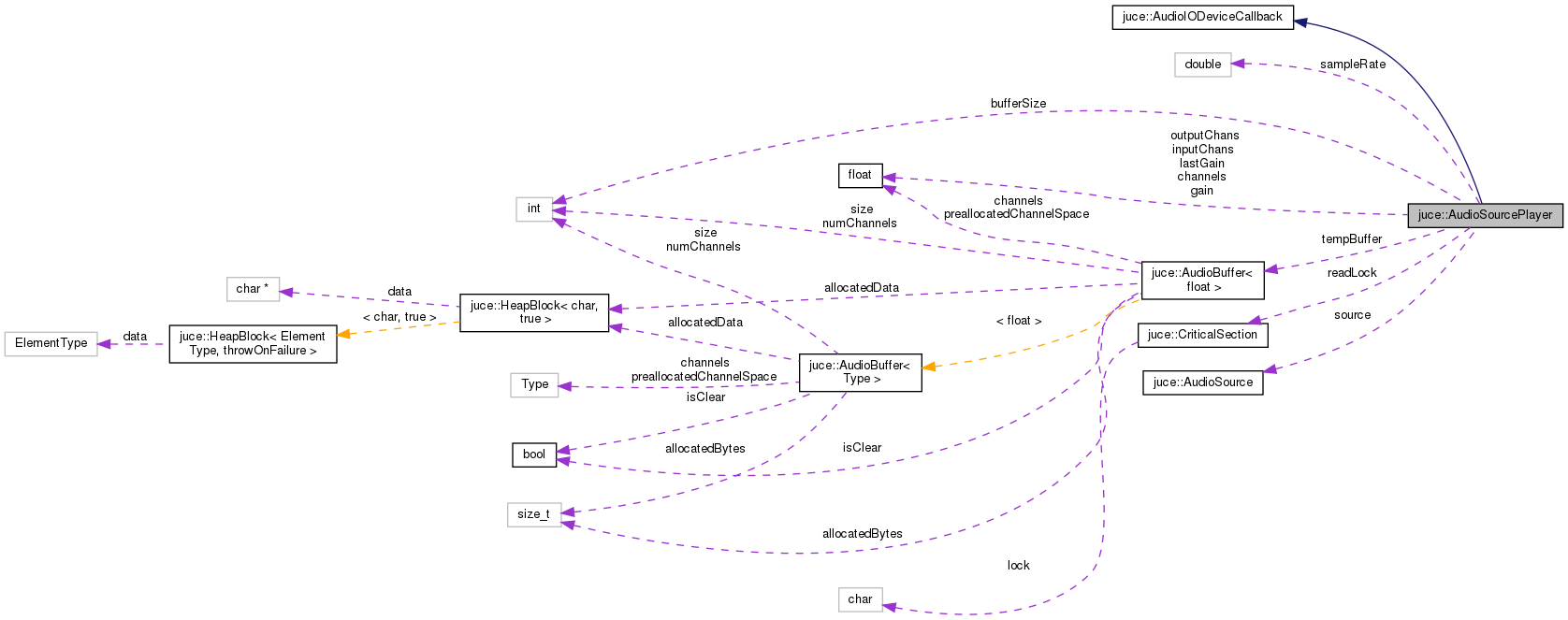Wrapper class to continuously stream audio from an audio source to an AudioIODevice.
More...
#include <juce_AudioSourcePlayer.h>
Wrapper class to continuously stream audio from an audio source to an AudioIODevice.
This object acts as an AudioIODeviceCallback, so can be attached to an output device, and will stream audio from an AudioSource.
{Audio}
◆ AudioSourcePlayer()
| juce::AudioSourcePlayer::AudioSourcePlayer |
( |
| ) |
|
◆ ~AudioSourcePlayer()
| juce::AudioSourcePlayer::~AudioSourcePlayer |
( |
| ) |
|
|
override |
Destructor.
Make sure this object isn't still being used by an AudioIODevice before deleting it!
◆ audioDeviceAboutToStart()
| void juce::AudioSourcePlayer::audioDeviceAboutToStart |
( |
AudioIODevice * |
device | ) |
|
|
overridevirtual |
◆ audioDeviceError()
| virtual void juce::AudioIODeviceCallback::audioDeviceError |
( |
const String & |
errorMessage | ) |
|
|
virtualinherited |
This can be overridden to be told if the device generates an error while operating.
Be aware that this could be called by any thread! And not all devices perform this callback.
Reimplemented in juce::SoundPlayer.
◆ audioDeviceIOCallback()
| void juce::AudioSourcePlayer::audioDeviceIOCallback |
( |
const float ** |
inputChannelData, |
|
|
int |
totalNumInputChannels, |
|
|
float ** |
outputChannelData, |
|
|
int |
totalNumOutputChannels, |
|
|
int |
numSamples |
|
) |
| |
|
overridevirtual |
◆ audioDeviceStopped()
| void juce::AudioSourcePlayer::audioDeviceStopped |
( |
| ) |
|
|
overridevirtual |
◆ getCurrentSource()
| AudioSource* juce::AudioSourcePlayer::getCurrentSource |
( |
| ) |
const |
|
inlinenoexcept |
Returns the source that's playing.
May return nullptr if there's no source.
◆ getGain()
| float juce::AudioSourcePlayer::getGain |
( |
| ) |
const |
|
inlinenoexcept |
Returns the current gain.
- See also
- setGain
◆ prepareToPlay()
| void juce::AudioSourcePlayer::prepareToPlay |
( |
double |
sampleRate, |
|
|
int |
blockSize |
|
) |
| |
An alternative method for initialising the source without an AudioIODevice.
◆ setGain()
| void juce::AudioSourcePlayer::setGain |
( |
float |
newGain | ) |
|
|
noexcept |
Sets a gain to apply to the audio data.
- See also
- getGain
◆ setSource()
| void juce::AudioSourcePlayer::setSource |
( |
AudioSource * |
newSource | ) |
|
Changes the current audio source to play from.
If the source passed in is already being used, this method will do nothing. If the source is not null, its prepareToPlay() method will be called before it starts being used for playback.
If there's another source currently playing, its releaseResources() method will be called after it has been swapped for the new one.
- Parameters
-
| newSource | the new source to use - this will NOT be deleted by this object when no longer needed, so it's the caller's responsibility to manage it. |
◆ bufferSize
| int juce::AudioSourcePlayer::bufferSize = 0 |
|
private |
◆ channels
| float* juce::AudioSourcePlayer::channels[128] |
|
private |
◆ gain
| float juce::AudioSourcePlayer::gain = 1.0f |
|
private |
◆ inputChans
| const float* juce::AudioSourcePlayer::inputChans[128] |
|
private |
◆ lastGain
| float juce::AudioSourcePlayer::lastGain = 1.0f |
|
private |
◆ outputChans
| float* juce::AudioSourcePlayer::outputChans[128] |
|
private |
◆ readLock
◆ sampleRate
| double juce::AudioSourcePlayer::sampleRate = 0 |
|
private |
◆ source
◆ tempBuffer
The documentation for this class was generated from the following file:

